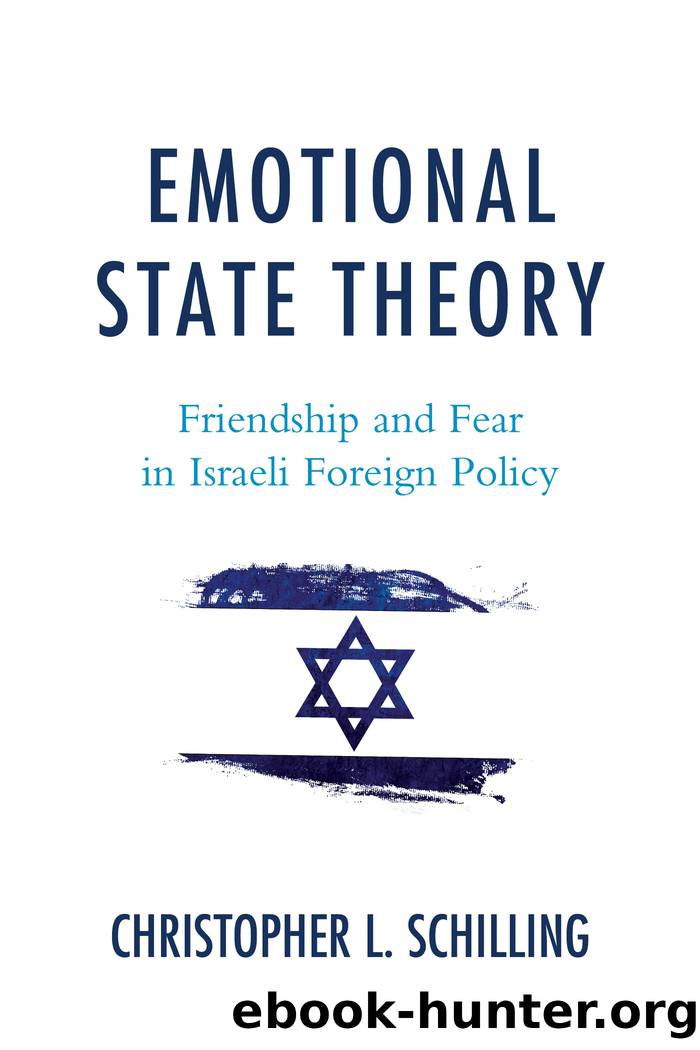Emotional State Theory by Schilling Christopher L.;

Author:Schilling, Christopher L.;
Language: eng
Format: epub
Tags: undefined
Publisher: Lexington Books
Published: 2012-08-15T00:00:00+00:00
The Concept of Friendship in IR
In this context Felix Berenskoetter (2007) has made an important contribution to our discipline with his concept of friendship in IR. I do agree with Felix Berenskoetter and I am very thankful for his contribution. He is surely right when he claims that if friendship is central for stabilizing the sense of self, then seeking friends must be seen as a fundamental objective of all states. Therefore, I argue that Israel needs, like all other states, friends to understand its existence as an unfolding story and to have a meaningful project for the future.
States become friends if they understand each other as virtuous and create significant structures of meaning among them by negotiating transnational narratives of order. Friendship marks an intimate relationship between states which voluntarily come together through shared ideas of the world arising from experiences and translated into a commitment to a common project for the future. Therefore, friendships can be understood as a project of building a world together to which states attach themselves emotionally (Berenskoetter, 2007).
At this stage, it should be made clear which factors do not automatically form bonds of friendship. Economic relations or geographic proximity are certainly not enough to call another state a friend, as various wars among neighboring countries or those with trade relations show. This is particularly true in the case of Israel where itâs not clear to the neighbors where the fence should be, and some still do not want Israel to live in the neighborhood. Nor can friendship mean simply sharing the same political system or religion, which both indeed make states believe in the same broad ideas. But as Felix Berenskoetter (2007) has shown in his work on the concept of friendship in IR, they are more a category of what he calls âgroup membership.â They are in fact too broad to satisfy the desire for authenticity and particularity of friendship. He then makes the very useful example that being a member of NATO or the EU, for instance, is not suitable for friendship, while the Anglo-American commitment of building âthe Westâ or the Franco-German reconciliation efforts through the project of European integration are indeed friendships (Berenkoetter, 2007: 670).
After all, friendship is an inward-oriented relationship, and is by all means more than just a non-enemy. It excludes others, but does not automatically oppose them. A common enemy is not needed to bond a friendship. So, in the international arena intimate relations are outnumbered by relations of indifference where emotional stakes are part of it, and where friends are surrounded by âfamiliar strangersâ (Berenskoetter, 2007).
Berenskoetter (2007) also examines in his work one of Judaismâs most important thinkers, Hannah Arendt (1970), who points to another aspect of friendship when she talks about power as the ability to achieve something together, to create something new. Friendship is, indeed, a source of creative energy, imagining the future and engaging in a project of âbuilding the worldâ and expanding the many possibilities open to the individual. Friendship does
Download
This site does not store any files on its server. We only index and link to content provided by other sites. Please contact the content providers to delete copyright contents if any and email us, we'll remove relevant links or contents immediately.
The Secret History by Donna Tartt(19083)
The Social Justice Warrior Handbook by Lisa De Pasquale(12190)
Thirteen Reasons Why by Jay Asher(8907)
This Is How You Lose Her by Junot Diaz(6885)
Weapons of Math Destruction by Cathy O'Neil(6279)
Zero to One by Peter Thiel(5799)
Beartown by Fredrik Backman(5751)
The Myth of the Strong Leader by Archie Brown(5507)
The Fire Next Time by James Baldwin(5441)
How Democracies Die by Steven Levitsky & Daniel Ziblatt(5218)
Promise Me, Dad by Joe Biden(5153)
Stone's Rules by Roger Stone(5087)
A Higher Loyalty: Truth, Lies, and Leadership by James Comey(4959)
100 Deadly Skills by Clint Emerson(4924)
Rise and Kill First by Ronen Bergman(4788)
Secrecy World by Jake Bernstein(4751)
The David Icke Guide to the Global Conspiracy (and how to end it) by David Icke(4717)
The Farm by Tom Rob Smith(4506)
The Doomsday Machine by Daniel Ellsberg(4490)
